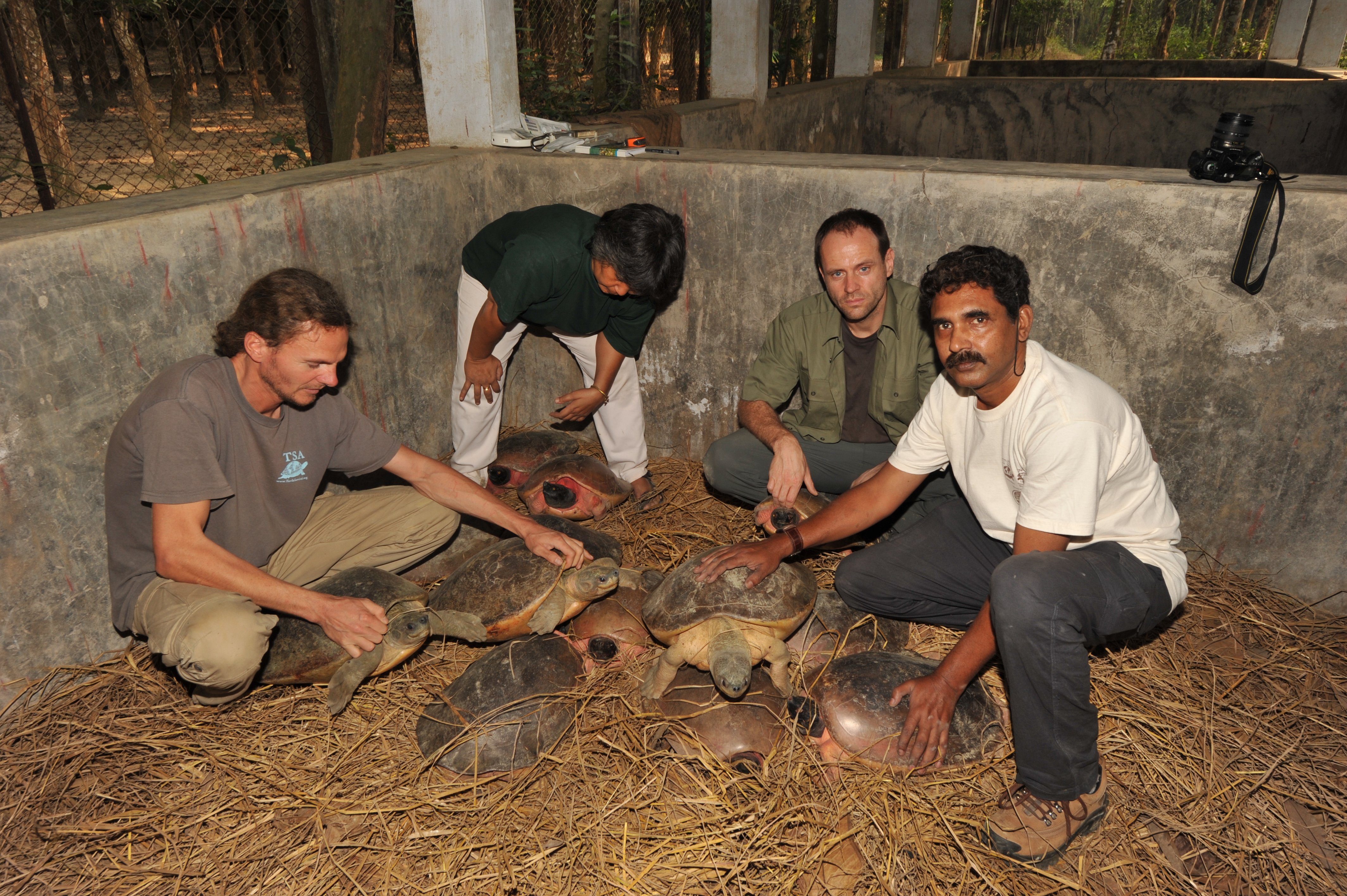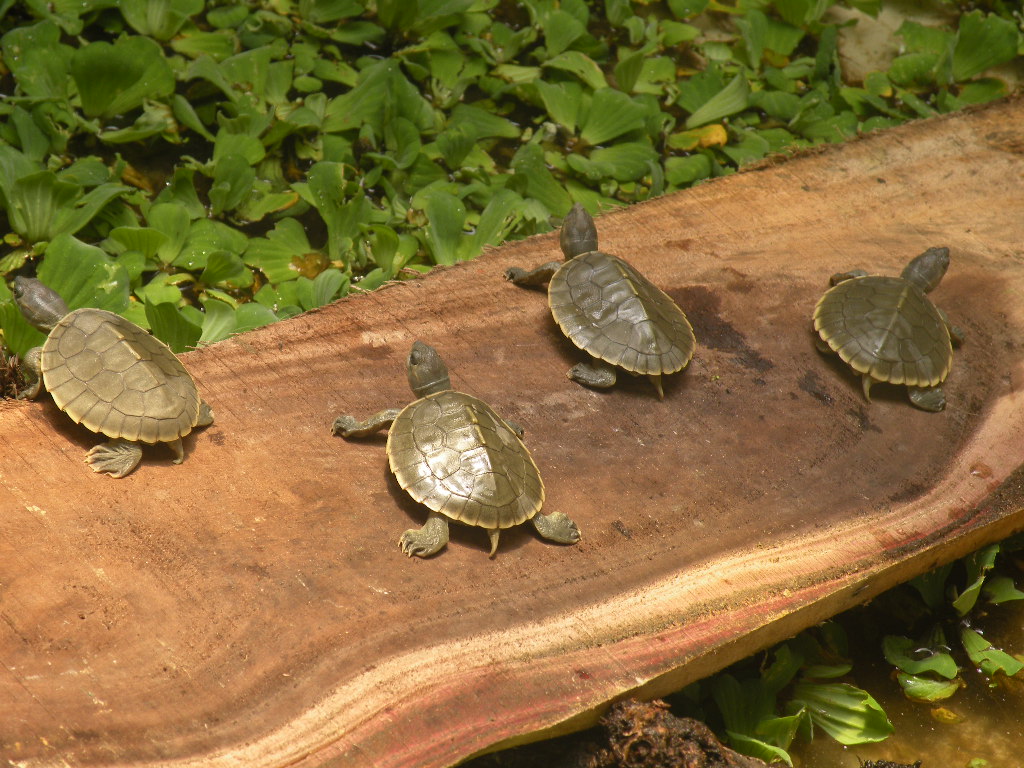One of World’s Rarest Turtles Gets Second Chance for Survival
by Rick Hudson 
 The Northern River Terrapin (Batagur baska), widely considered one of the most critically endangered of the large river terrapins, is getting a new lease on life due to some remarkable breeding successes recently. Since 2009, the TSA has been working to secure a small captive population of in Bangladesh, and over the years managed to acquire 14 males and five females from “backyard” fish breeding operations. Some of these turtles had been in captivity for more than 25 years, often under adverse conditions, a testament to their durability. The TSA works in collaboration with the Bangladeshi NGO CARINAM and the Forest Department, and has established a breeding facility at the Bhawal National Park near Dhaka. The Vienna Zoo in Austria joined as a strong partner in 2010 and has provided significant technical and financial support to the program. Over the years we have reported our share of disappointments, including the loss of several important females just days before the team arrived to purchase them, to the loss of our only nest last year due to heavy rains and flooding.
The Northern River Terrapin (Batagur baska), widely considered one of the most critically endangered of the large river terrapins, is getting a new lease on life due to some remarkable breeding successes recently. Since 2009, the TSA has been working to secure a small captive population of in Bangladesh, and over the years managed to acquire 14 males and five females from “backyard” fish breeding operations. Some of these turtles had been in captivity for more than 25 years, often under adverse conditions, a testament to their durability. The TSA works in collaboration with the Bangladeshi NGO CARINAM and the Forest Department, and has established a breeding facility at the Bhawal National Park near Dhaka. The Vienna Zoo in Austria joined as a strong partner in 2010 and has provided significant technical and financial support to the program. Over the years we have reported our share of disappointments, including the loss of several important females just days before the team arrived to purchase them, to the loss of our only nest last year due to heavy rains and flooding.
 But in 2012 we struck pay dirt. From late March through early April, all five females nested within a 24 day period, using the improved sand bank that was provide, laying a total of 92 eggs. Prior to egg laying a team led by Peter Praschag had trained staff on proper egg handling and incubation techniques, and oversaw the conversion of an artificial incubation facility. All five nests were protected with heavy wire cages designed to deter predators, and remote thermometers were installed to monitor incubation temperatures. The Bangladesh team led by SMA Rashid and AJG Morshed did a credible job of monitoring the clutches through incubation, and communicated with us daily on their findings. All this care and attention to detail paid off when the eggs began to hatch on June 7, after 64 days of incubation. All total, 27 hatchlings emerged from the five nests, not bad given the compromised nutritional condition of two of the recently acquired females. Twenty-five survived and are growing rapidly in the newly renovated hatchling facility.
But in 2012 we struck pay dirt. From late March through early April, all five females nested within a 24 day period, using the improved sand bank that was provide, laying a total of 92 eggs. Prior to egg laying a team led by Peter Praschag had trained staff on proper egg handling and incubation techniques, and oversaw the conversion of an artificial incubation facility. All five nests were protected with heavy wire cages designed to deter predators, and remote thermometers were installed to monitor incubation temperatures. The Bangladesh team led by SMA Rashid and AJG Morshed did a credible job of monitoring the clutches through incubation, and communicated with us daily on their findings. All this care and attention to detail paid off when the eggs began to hatch on June 7, after 64 days of incubation. All total, 27 hatchlings emerged from the five nests, not bad given the compromised nutritional condition of two of the recently acquired females. Twenty-five survived and are growing rapidly in the newly renovated hatchling facility.
 Meanwhile in West Bengal India, a small captive group of about ten B. baska had been maintained for many years at the visitor center for the Sundarbans Tiger Reserve at Sanjekhali, though they had never reproduced. A TSA India team led by Shai Singh visited this facility in March and made recommendations for improvements to the facilities including the addition of a nesting beach. Surprising, this simple husbandry adjustment was sufficient to induce successful egg-laying, because on 12 June the staff found hatchling Batagur swimming in the pond, recently emerged from undetected nests. 25 hatchlings were recovered.
Meanwhile in West Bengal India, a small captive group of about ten B. baska had been maintained for many years at the visitor center for the Sundarbans Tiger Reserve at Sanjekhali, though they had never reproduced. A TSA India team led by Shai Singh visited this facility in March and made recommendations for improvements to the facilities including the addition of a nesting beach. Surprising, this simple husbandry adjustment was sufficient to induce successful egg-laying, because on 12 June the staff found hatchling Batagur swimming in the pond, recently emerged from undetected nests. 25 hatchlings were recovered.
All total, 50 new B. baska have been added to the dwindling population, significantly bolstering this species’ outlook for survival. With such a small number of breeding females – eight – the challenge next will be to set up breeding pairs or trios to maximize the genetic potential of as many wild-caught founders as possible, and to closely manage this small population according to studbook guidelines. A third captive population will soon be established at the Madras Crocodile Bank Trust when Vienna Zoo sends a male to join the two existing females that have lived there for many years. Outside the range, Vienna Zoo holds the only known captive group of B. baska. This program has achieved remarkable success in a very short time frame, and is a reflection both of the urgency of the situation coupled with a generous and caring donor community. We gratefully acknowledge the following for their ongoing previous and ongoing support: Patricia Koval/ WWF Canada, Fagus Foundation, Columbus Zoo, Toronto Zoo, AAZK - Henry Doorly Zoo, Wade Foundation through the Cleveland Metroparks Zoo, Natural Encounters Conservation Fund, San Diego Zoo, Toronto Zoo, Cassidy Johnson and Walter Sedgwick.
